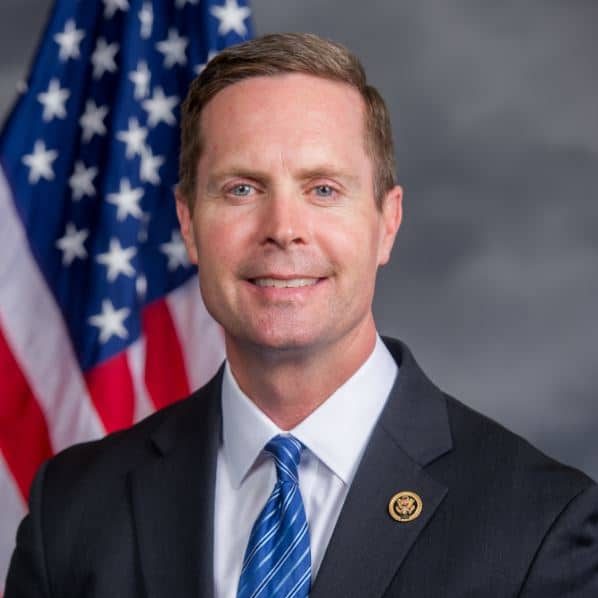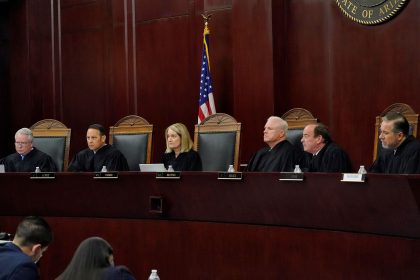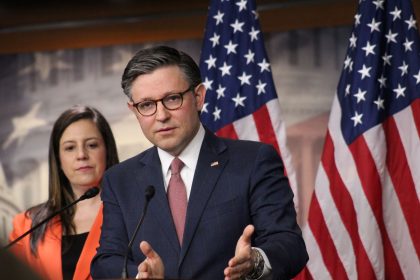Rodney Davis, Fighting a Pandemic at Home and in DC

It was cold and rainy in Taylorville, Illinois as Rep. Rodney Davis answered his phone to discuss the new normal that comes with living through a pandemic.
As Davis spoke, his wife Shannon was working as a practicing nurse at Memorial Medical Center in Springfield, Illinois, where several COVID-19 patients are being treated.
Elsewhere in the house, the Davis children — Toryn, Clark, and Griffin — are otherwise occupied, leaving the congressman in the company of the family dogs, Juliet and Ryder, the latter a Parti Yorkie with a penchant for getting on TV whenever a virtual interview is at hand.
“He’s a Yorkshire terrier with the coloring of a Beagle,” the Illinois Republican said as he laughed over Ryder’s most recent appearance, on C-SPAN the previous Tuesday morning.
“And he just loves getting into the camera shots. I mean, every time. Every time I’m doing a Skype or a Zoom or something, he will pop up on the couch and then start bobbing up and down,” the representative said.
“I don’t know how they know they’re in the camera shot, but they do,” Davis said.
Despite the levity of the moment, the conversation soon turned to the brave new world that is legislating at a time of national crisis; a calamity that has most Americans — including most lawmakers — sheltering at home until the danger passes.
“We’re adapting like everybody else is having to adapt,” Davis said. “It’s a pandemic that no level of government was prepared for … that the country, as a whole, was not prepared for … and we can spend time Monday morning quarterbacking all we want once we end this pandemic and get back to a sense of normalcy …but right now we have to deal with the reality we’ve been handed.”
Davis said for himself and the colleagues he talks to on a daily basis, the biggest change in their daily routines — “since the pandemic changed the world overnight” — has been handling an exponential surge in calls, texts and social media requests from constituents.
“I think the first thing that happened as this began to unfold was that people wanted to see us,” he said. “They wanted us out and about to talk to them about what was happening.
“As that became impossible, technology became our great ally when it came to doing constituent service work,” he added.
Davis said his constituents call him about a wide variety of issues, the most prevalent question being “How is my business going to survive?”
“And that question helped us develop the Payroll Protection Program through the Small Business Administration,” he said.
Davis said much of what members of Congress are doing right now as they abide by stay-at-home orders in their districts is “putting out constituent fires” and helping them handle problems and questions raised in dealing with the federal and other bureaucracies.
As an example, he pointed to the case of a young boy in his district who is battling brain cancer.
The boy had been part of a clinical trial, but was about to term out of it and needed approval from the pharmaceutical company to continue. The problem was, with companies in the process of making wholesale changes in how their employees worked, it proved nearly impossible to get the necessary approval in the required time.
“We called the pharmaceutical company and got them to take a look at the case, and thankfully, they were able to approve his remaining in the critical trial a day before he would have lost that opportunity,” Davis said.
Growing Frustration
As satisfying and important as those victories may be, Davis nevertheless admits to being frustrated at not being on Capitol Hill, legislating.
“The majority of us in Congress are type-A personalities, but we all also recognize that the key to getting things done for our constituents is face-to-face interaction,” he said, “That’s what allows people to get to know each other outside of politics and enables us to say ‘Okay, We may disagree on some political issues, but we can definitely come to some kind of agreement on this or that matter.’
“What I can tell you, from the perspective of having six and a half weeks of personal experience, is that technology is not a replacement for personal interaction outside of the political spectrum and personalizing Congress. To me, moving Congress to a complete reliance on remote technology would make Congress even more polarized.”
The problem is, striking the balance demanded by the pandemic has not been easy. A proposal to carry out votes in the House chamber by utilizing proxy votes for absent members was tabled, and no consensus has formed around a specific technology that would make the House fully functional again.
“One of the problems, I think, is that the majority Democrats tried to confuse the issue,” Davis said. “They tried to make remote voting and proxy voting one and the same and synonymous, and that was not the case.
“Proxy voting is a process that was used in Congress in the past, and it had been hijacked by leadership and committee chairs until it was abolished, on the committee level, by Republicans when they took over the House in 1995,” he said.
“At the same time, remote voting is not something that is allowed in our procedures,” Davis continued. “So we’ve got to take a crawl, walk, run approach with technology.
“We’ve got to figure out, ‘Is there a technology to allow remote voting?’ ‘Is there a technology that’s going to work on a House network that gets 1.6 billion attempted cyber attacks on it each month?’ ‘And is everybody going to have equal access to utilizing that technology, with the differences in broadband connections, based on where you live?'”
Davis asserted that most Democrats favor utilizing remote technology because most of the urban areas they represent have access to very fast broadband connectivity.
“Now, I’ve got great broadband service where I live, but many of my colleagues, those who represent more rural areas, do not. And that has to be taken into consideration,” he said.
Perception Versus Reality
The conversation next turned to the public perception of Congress during the pandemic, and whether the news emanating from Washington has gotten too leadership heavy with so many members back home in their districts.
“I think there’s always a divergence between perception and reality,” Davis said. “And the reality is, we could be in D.C., or we could be back home, but at the end of the day it’s up to us to make sure our constituents know how we influenced a policy change.
“Frankly,” he laughed, “the only time people remember what a member has gotten into a bill is when they want to beat them up politically for it.
“But more seriously, I think the irony of this entire pandemic relief process has been that I and many of my colleagues probably feel more engaged in legislating — as a direct consequence of Treasury Secretary Steve Mnuchin and the administration.
“[Minority] Leader [Kevin] McCarthy has also been instrumental in getting administration officials to work with us and listen to our ideas on things like the Payroll Protection Program, and I think that’s helped legislators feel their voices have been heard.”
But Davis went on to say there’s a sense of disquiet that goes along with the short-term satisfaction.
“The processes I’m talking about only work if you want to do large, trillion dollar-plus relief,” he said. “In the meantime, nothing is getting done at the committee level.
“We’re not talking about a normal appropriations process,” Davis said. “We’re not talking about a National Defense Authorization Act that needs to get done. We’re not talking about normal infrastructure reauthorizations that need to get done.
“That’s why we have to get our committees working again, because it is only through the committee process that every member has a voice in how things are put together on the front end,” he continued. “That’s the way we normally craft large pieces of legislation in Congress, but it’s not what we’re doing now.”
Davis readily conceded that whenever Congress returns to the Hill, it’s going to be a vastly different Congress than they left on Friday, March 13.
“Clearly, the reality of that Congress doesn’t exist anymore,” he said. “The operation of Congress has changed dramatically. … nevertheless, we’ve got to make sure the Democrats understand that we can go back to work, just as every other essential worker in our nation has been able to go to work,” he said.
“Every single day we are not allowed to do our job in Washington, on the committee level, is another day the majority party wants to legislate from the top — and frankly, if I was a freshman Democrat running in a tight race, I’d want to be in Washington, making sure my voice is heard, because that’s what their constituents demand.
“If we don’t come back to Washington in the relatively near future, it’s going to be harder and harder for individual members to claim their voices are being heard. I mean, it’s just a simple fact, how can you say that if you’re not working in Washington and doing the job that we were elected to do.”
























